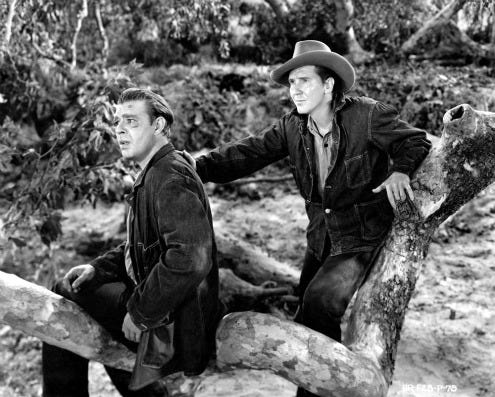Of Mice and Men (1939)

I've always felt that the characters of John Steinbeck's "Of Mice and Men" were more allegories for different facets of humanity rather than believable, flesh-and-blood people.
It's pretty obvious, for example, that the gigantic man-child Lennie Small represents the undeveloped id -- pure, innocent, harmless in thought but capable of an instinctual lashing out at those who hurt him. Lon Chaney Jr., not yet typecast as the monster in endless creature features, made Lennie an iconic character whose rolling speech patterns and fumbling charm would influence generations of portrayals on stage and screen.
His partner, George Milton, is the common man who yearns for a better life away from back-breaking ranch work bucking bales for some uncaring boss. He and Lennie share a dream of owning their own stake, a little place where they can "live off the fat of the land." As played by Burgess Meredith, George is resolute but not stubborn, clever but not calculating, doesn't look for a fight but doesn't back away from one, either.
Curley, the pugnacious son of the boss, is fiercely protective of his beautiful new wife, and has a chip on his shoulder the size of the moon -- particularly against big men like Lennie. Short-statured but a former semi-pro boxer, Curley (Bob Steele) is in some ways Lennie's shadowy reflection -- impulsive, instinctual, vindictive. He never seems to think more than one step ahead of his actions. He can only hold a few thoughts in his head at time, mostly blind rage and jealousy, in much the same way Lennie is fixated on small soft creatures and objects he can stroke.
Both men are singular in purpose -- Lennie to adore, and Curley to despise.
Curley's wife -- played by Betty Field and credited as Mae, though she's only known in the book as "Curley's wife" -- is deathly bored by life on the ranch. Without anything to do or anyone to talk to, she takes to flirting with and teasing the ranch hands, knowing full well it will send Curley into another rage and have him giving "the old one-two" to some unlucky employee. We suspect that even though Curley's wife expresses disgust for all the fights she causes, she secretly harbors joy for holding the center of attention.
From the 1939 film, I'm most intrigued by Slim (Charles Bickford), the mule skinner and "prince of the ranch." Slim is looked up to by all the other ranch hands, and is the one man Curley dares not provoke. He takes an instant liking to George and Lennie, though he's careful not to show favoritism. Slim is the only character who understands that George kills Lennie out of love and pity, after he oafishly breaks Curley's wife's neck when she foolishly invited him to stroke her hair.
For me, Slim's critical moment comes in the showdown between Carlson (Granville Bates), a crusty older worker, and Candy (Roman Bohnen), the one-handed old man. Carlson can't stand the stink of Candy's ancient, decrepit dog, calling it a travesty to keep the animal alive when it's no use to itself. Candy is deeply attached to the animal, perhaps his only true friend in the world, and looks to Slim to defend him.
But Slim admits it's probably for the best that the dog be put down, and Candy allows Carlson to take it outside and shoot it in the back of the head -- the same way George will later kill Lennie, and for much the same reasons.
Slim, I think, represents the best of mankind, the rational and upstanding side, that nevertheless often stands aside and lets evil come to pass. The natural state of humanity is to be kind to each other, Steinbeck says -- holding George and Lennie up as an imperfect example -- until the twisted selfishness and moral rot represented by, respectively, Curley and his wife warps the way things were intended.
Slim, unafraid to stare down Curley and defend his own reputation, is reluctant to interfere when others become a target. It's an old-school notion of virility, in which a man must stand up for himself, or he's worthless. Slim allows the brewing trouble between Curley and Lennie to boil over not because he's afraid, but because he believes it's not his business to get involved.
It's interesting how the reputation of this film has waned and peaked over time. Directed and produced by Lewis Milestone from a screen adaptation by Eugene Solow, it received four Oscar nominations, including one for Best Picture. It was the first major film adaptation of a Steinbeck property, rushed into theaters before 1940's "The Grapes of Wrath," which went on to enjoy a much more hallowed reputation.
The 1939 version saw something of a revival in the 1970s and '80s, including a stage adaptation at the Steppenwolf Theatre starring Gary Sinise and John Malkovich, which they would go on to reprise in a 1992 film directed by Sinise. Still, other than Lon Chaney's portrayal of Lennie, his film has faded in memory, and unfairly so.
Aaron Copland's evocative musical score -- his first for a feature film -- was also nominated for the Academy Awards.
4.5 Yaps



